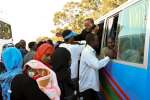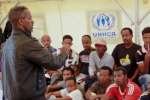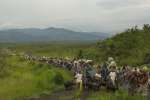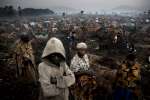- Text size
 |
|  |
|  |
| 
- Français
A Congolese mother and her sons regain hope in Cape Town
News Stories, 10 July 2013
CAPE TOWN, South Africa, July 10 (UNHCR) – Mzuji Kadima lives with xenophobia, sexual harassment and the threat of rape in the shack she shares with her two sons in Cape Town's Samora Machel Township. On a typical recent night, the Congolese refugee was woken by three men thumping the corrugated iron wall of their home. "Come out right now! We want you to be our wife for the night!" one bully shouted.
Trying not to show his fear, 18-year-old Patrick Kadima got up, opened the door and confronted the men. "Leave us alone," the tall, slender teenager shouted, trying to look intimidating. "Stay away from my mother. She is too old for you," he said of Mzuji, who is 49. The harsh knocking immediately stopped and male voices could be heard whispering from outside before fading away.
It's become almost a nightly ritual. Patrick also faces daily harassment and racist insults on the way to high school, a journey which he has to make on foot because his mother needs the money for essentials. His brother Yannick takes the train because he is only six years old and the journey is long. Patrick tries not to let the xenophobia get to him because he is determined to do well in his final exams and improve his chances in life.
But it just adds to his mother's nerves. "I tell Patrick not to go to school because it is too dangerous. I can teach him how to do hair and he can earn money that way," says Mzuji, who earns enough from braiding hair to pay for rent, food and the education of her sons. "I worry about him from the minute he leaves the house until he is back."
That should soon change because of a nationwide programme run by the UN refugee agency to offer protection and find solutions for people in need in urban areas, like the Kadima family.
Under UNHCR's Protection Needs Assessment (PNA) programme, Mzuji and her sons were identified late February in Cape Town as vulnerable. They were interviewed for resettlement and will be moved to a safer location. It is a long process, but just being considered has given them – and other refugees – hope.
Reaching the most needy refugees and asylum-seekers in urban areas is a challenge. With limited resources, UNHCR struggles to identify the number of people of concern and this means it is difficult to determine their needs and how best to assist. Since 2009, UNHCR teams comprising experts in protection, community services and resettlement staff have been working to fill the gaps under the PNA programme.
Alphonse Munyaneza, UNHCR's senior regional community services officer, said that many of the people that his staff saw regularly were not necessarily those who were most in need. "The PNA methodology has been the most effective way for us to reach the most marginalized individuals," he stressed.
Mzuji, as a single mother and refugee, clearly fell into this group with her boys, but they were not aware that help was close at hand. She had fled from South Kivu province in Democratic Republic of the Congo 12 years ago after her husband was killed for his political beliefs.
On her own with two young boys, Mzuji sought asylum in South Africa in 2001, hoping to find peace and stability. But in 2008 the family was caught up in a wave of xenophobic attacks that targeted foreigners, including refugees and asylum-seekers, in townships across the country. Their shack was torched and their few belongings lost.
They eventually rebuilt their home in the same tense neighbourhood, unable to afford the rent somewhere safer. Mzuji pays US$40 a month on rent and the rest on feeding and schooling her boys – and worrying about them, especially Patrick. But the headstrong boy was determined to push ahead with his studies, despite being insulted and even robbed and beaten several times during his trek to school.
"I didn't come this far just to stop in my final year," he told UNHCR, adding, "I see a future ahead of me. I want to provide a safe home for my family." Meanwhile, Mzuji can also see a better future. "I hope once we get resettled, I will be able to sleep in peace for one week," she said.
By Nozipho Ncube in Cape Town, South Africa
















































